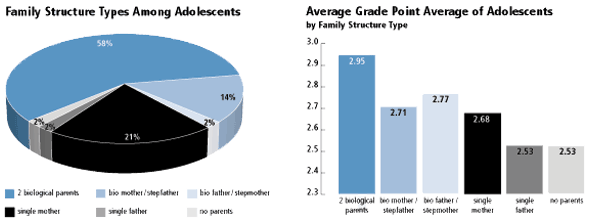

A publication of The Graduate School, University of North Carolina at Chapel Hill
Archives Spring 2002
Home | Back issues | About us | Email your feedback | The Graduate School | UNC-Chapel Hill | Make a gift

 |
| Photo by Karen Tam |
Sociologist Holly Heard investigates family structure and adolescent educational success
Holly Heard, Carolina doctoral candidate and researcher in the Department of Sociology, investigates the critical impact family structure has on adolescents’ educational success. As a pre-doctoral trainee for the Carolina Population Center, Heard has access to some of the most comprehensive data available on adolescent life, the National Longitudinal Study of Adolescent Health (Add Health). The Jesse Ball duPont Fellowship, within the Royster Society of Fellows, allowed Heard to concentrate exclusively on her research this year, and her work has already yielded some important findings.
Heard took a break from her
research Oct. 24, 2001, to speak with The Fountain’s Kirsten
Weeks.
The Fountain: What is the Add Health Project?
Holly Heard (HH): Add
Health is a multi-wave study examining the mental, behavioral and physical
health of adolescents, as well as the school, peer, family and neighborhood
contexts in which they live. The study is funded by 17 federal agencies
plus the National Institute of Child Health and Human Development, part
of the National Institutes of Health. This project is based on a survey
of about 20,000 adolescents nationwide and it tracks the adolescents’
development throughout their lives. Adolescents were interviewed in 1994,
1995 and 1996. Add Health is now in the field conducting another wave
of interviews with the same subjects who are now young adults. We use
this data and other sources to get a sense of how the school-neighborhood-family
context impacts adolescent health. The average education level of the
neighborhood and adolescents’ proximity to health clinics and gyms
are examples of the contextual data we collect.
The Fountain: How does your dissertation research fit in with Add
Health?
HH:
Add Health gleans
a tremendous amount of information about how adolescents live. My dissertation
zeroes in on how the family structure impacts adolescent educational success.
I examine the impact of different family structure types, such as biological
parents, single parents, stepparents and other non-biological parent families,
on educational achievement. I look at grades, suspension or expulsion
from school and educational expectations, such as whether or not they
plan to go to college.
The Fountain: What discoveries have you made in your research so
far?
HH: When
you’re looking at the impact of family structure on education, moms
are very important. In all areas — grades, educational expectations
and expulsions — it’s clear that the time an adolescent spends
living with the mother is critical in predicting educational success.
My research shows that the
longer kids live without a biological mother, the lower their grade point
average. When the biological mother is replaced by another figure, like
a stepmother, that can also have a damaging impact on an adolescent’s
education. Any such change in an adolescent’s life increases the
likelihood of expulsion from school and decreases the likelihood of college
expectations.
The Fountain: What is the end goal of your research?
HH: I
want to find out how family structure impacts adolescents’ educational
achievement. Most family structure studies use static or one-time data,
even though adolescents have the potential to live with multiple combinations
of family structures throughout their lives. Examining family structure
throughout adolescents’ development offers the possibility of establishing
links between family structure and adolescent educational success.
The Fountain: What made you choose to attend graduate school at
Carolina?
HH: When
you first apply to graduate school, you need a mentor, someone who can
guide you. I asked myself, who are the people I’d like to work with?
Kathleen Mullan Harris at the University of North Carolina at Chapel Hill
was at the top of the list. Carolina has one of the top five sociology
departments in the country, and once I started applying to schools, I
found out that researchers at the Carolina Population Center at UNC-Chapel
Hill were working on the Add Health Project, which is the only dataset
I’ve found in the United States that is appropriate for my research.
I knew I wanted to be here.
The Fountain: How has the Jesse Ball duPont Fellowship affected
your experience at Carolina?
HH: It
has taken care of my tuition and fees and has permitted me to take this
year to focus on my dissertation. I’ve really enjoyed being part
of the Royster Society of Fellows. It allows me to explain my research
to people who know nothing about what I do. If you can’t make what
you do relevant to others, you shouldn’t be doing it. I believe what
I do is important and I’m learning to communicate that to others.
And, as an added bonus, I’m also learning about the research of other
Royster Fellows.
The Fountain: What are your plans for the future, after you complete
your dissertation?
HH:
After graduation,
I start work as an assistant professor in Family and Human Development
and in Sociology at Arizona State University-Tempe. I want to continue
looking at the effects of family structure. The next step of my research
will focus on how family structure creates inequality in adulthood. Did
the adolescents interviewed by Add Health go to college or have a child
out of wedlock? What kind of jobs do they have? I want to establish the
link between family structure during adolescence and adult socio-economic
status.
Eventually, I want my work to help parents and their employers understand the implications of family structure on a child’s educational development. This research could lead to public policy and workplace changes that will dramatically increase an adolescent’s chance of educational success and socio-economic equality.
 |
|
| Graphs courtesy of Holly Heard | |
| Graphs based on Add Health sample of 10,268 adolescents in grades seven to 12. Family structure data was collected in 1995 and grade point averages were collected in 1996. | Average GPA is highest for adolescents living with two biological parents. For other family structure types, average GPA of adolescents is significantly different from those living with two biological parents. |
© 2002, The Graduate School, The University of
North Carolina at Chapel Hill
All text and images are property of The Graduate School
at the University of North Carolina-Chapel Hill. Contact Sandra Hoeflich
at shoeflic@email.unc.edu
to request permission for reproduction.
Contact Alexandra Obregon at aobregon@email.unc.edu if you have technical problems with this Web site.